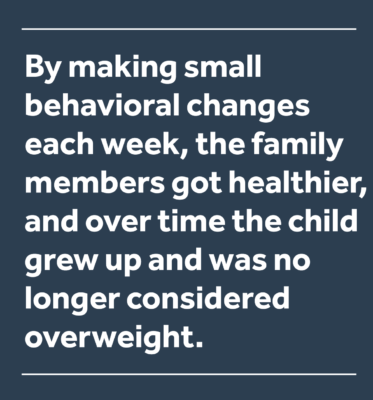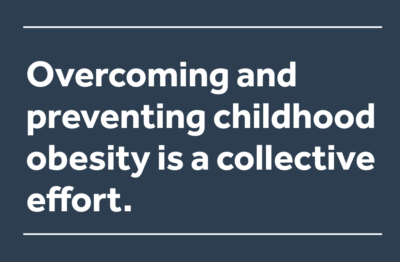This begins with a story about a child – one who was too heavy for his age. This child, like many others, came into our clinic referred to us by his primary care physician. At barely 10 years of age, the child had high blood pressure, high blood sugar, joint pain, and low self-esteem. He did not want to engage in sports and his food choices were limited by the foods available at his home or school. The child’s mother was diagnosed with type 2 diabetes and was worried that this condition would be passed to her children, yet she was not aware that her child being overweight was a health problem now. He was just a child, he would overcome and become a healthier version of himself as he grew up, the mother thought. However, if the weight was left untreated, this child would most likely not get better and his chances of being an adult with weight issues were increasingly higher.
 From my experience with this and other similar cases, I learned that the child’s condition would improve only when his parents and other relevant players became aware that this was a health problem that emerged from repeated negative behaviors and unrealistic assumptions that led this child to be overweight. Moreover, it was likely that not only the child was overweight, but that other family members were overweight given the shared environment of the household.
From my experience with this and other similar cases, I learned that the child’s condition would improve only when his parents and other relevant players became aware that this was a health problem that emerged from repeated negative behaviors and unrealistic assumptions that led this child to be overweight. Moreover, it was likely that not only the child was overweight, but that other family members were overweight given the shared environment of the household.
Fortunately, this story has a happy ending. Eventually both parents got involved in learning behavioral change skills. By making small behavioral changes each week, the family members got healthier, and over time the child grew up and was no longer considered overweight.
Evidence-based behavioral changes include:
- Involving children in preparing meals
- Having meals at home as opposed to eating out
- Letting children decide which changes (from an array of options) they want to undertake and get the parents on board to support the child
- Limiting screen time and increase physical activity
- Limiting sugar-sweetened beverages and increase water consumption
- Having bedtime routine consistency
- Improving food environment at the household level (i.e. have more fruits and vegetables readily available)
Overcoming and preventing childhood obesity is a collective effort. It requires everyone to get onboard–researchers, community members, school authorities, policy makers and the healthcare system. Obesity prevalence in the United States was 26.2% among Hispanic children, 24.8% among non-Hispanic Black children, 16.6% among non-Hispanic White children and 9% among non-Hispanic Asian children in 2020 (cdc.gov). This is nationwide health issue that cannot wait to be addressed.
 My research is focused on how to prevent children from developing obesity. What can we do to keep a child from ever becoming overweight? I seek to design a program that helps parents engage in positive parenting practices and behaviors that are attainable and sustainable over time, while engaging other stakeholders, to prevent childhood obesity.
My research is focused on how to prevent children from developing obesity. What can we do to keep a child from ever becoming overweight? I seek to design a program that helps parents engage in positive parenting practices and behaviors that are attainable and sustainable over time, while engaging other stakeholders, to prevent childhood obesity.
Paola Campos is a postdoctoral research associate in the Goode Lab at the UNC Nutrition Research Institute. Campos’s research examines risk and protective factors for child malnutrition, and the impact of the social determinants on health disparities among underserved populations. Her current research interests have been shaped by a gradual evolution of professional experiences from diverse clinic- and community-based research projects in Mexico, Guatemala, and the U.S.

